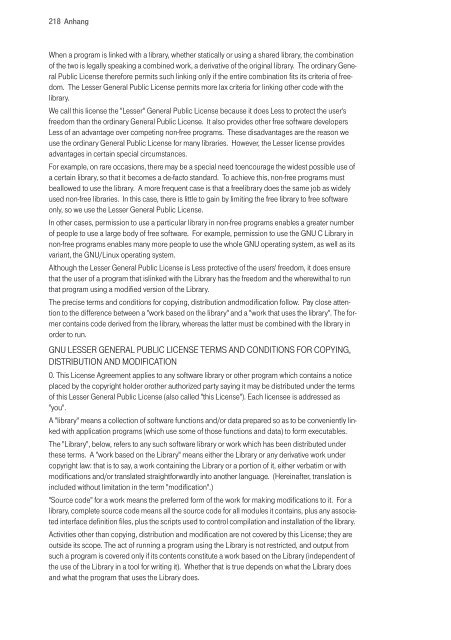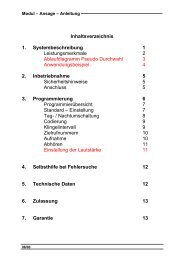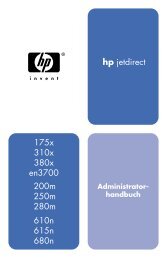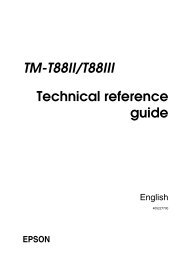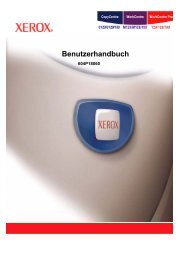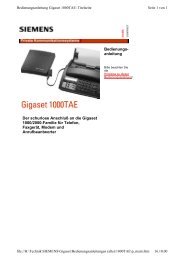Sinus 501V - Dig it!
Sinus 501V - Dig it!
Sinus 501V - Dig it!
Sie wollen auch ein ePaper? Erhöhen Sie die Reichweite Ihrer Titel.
YUMPU macht aus Druck-PDFs automatisch weboptimierte ePaper, die Google liebt.
218 Anhang<br />
When a program is linked w<strong>it</strong>h a library, whether statically or using a shared library, the combination<br />
of the two is legally speaking a combined work, a derivative of the original library. The ordinary General<br />
Public License therefore perm<strong>it</strong>s such linking only if the entire combination f<strong>it</strong>s <strong>it</strong>s cr<strong>it</strong>eria of freedom.<br />
The Lesser General Public License perm<strong>it</strong>s more lax cr<strong>it</strong>eria for linking other code w<strong>it</strong>h the<br />
library.<br />
We call this license the "Lesser" General Public License because <strong>it</strong> does Less to protect the user's<br />
freedom than the ordinary General Public License. It also provides other free software developers<br />
Less of an advantage over competing non-free programs. These disadvantages are the reason we<br />
use the ordinary General Public License for many libraries. However, the Lesser license provides<br />
advantages in certain special circumstances.<br />
For example, on rare occasions, there may be a special need toencourage the widest possible use of<br />
a certain library, so that <strong>it</strong> becomes a de-facto standard. To achieve this, non-free programs must<br />
beallowed to use the library. A more frequent case is that a freelibrary does the same job as widely<br />
used non-free libraries. In this case, there is l<strong>it</strong>tle to gain by lim<strong>it</strong>ing the free library to free software<br />
only, so we use the Lesser General Public License.<br />
In other cases, permission to use a particular library in non-free programs enables a greater number<br />
of people to use a large body of free software. For example, permission to use the GNU C Library in<br />
non-free programs enables many more people to use the whole GNU operating system, as well as <strong>it</strong>s<br />
variant, the GNU/Linux operating system.<br />
Although the Lesser General Public License is Less protective of the users' freedom, <strong>it</strong> does ensure<br />
that the user of a program that islinked w<strong>it</strong>h the Library has the freedom and the wherew<strong>it</strong>hal to run<br />
that program using a modified version of the Library.<br />
The precise terms and cond<strong>it</strong>ions for copying, distribution andmodification follow. Pay close attention<br />
to the difference between a "work based on the library" and a "work that uses the library". The former<br />
contains code derived from the library, whereas the latter must be combined w<strong>it</strong>h the library in<br />
order to run.<br />
GNU LESSER GENERAL PUBLIC LICENSE TERMS AND CONDITIONS FOR COPYING,<br />
DISTRIBUTION AND MODIFICATION<br />
0. This License Agreement applies to any software library or other program which contains a notice<br />
placed by the copyright holder orother authorized party saying <strong>it</strong> may be distributed under the terms<br />
of this Lesser General Public License (also called "this License"). Each licensee is addressed as<br />
"you".<br />
A "library" means a collection of software functions and/or data prepared so as to be conveniently linked<br />
w<strong>it</strong>h application programs (which use some of those functions and data) to form executables.<br />
The "Library", below, refers to any such software library or work which has been distributed under<br />
these terms. A "work based on the Library" means e<strong>it</strong>her the Library or any derivative work under<br />
copyright law: that is to say, a work containing the Library or a portion of <strong>it</strong>, e<strong>it</strong>her verbatim or w<strong>it</strong>h<br />
modifications and/or translated straightforwardly into another language. (Hereinafter, translation is<br />
included w<strong>it</strong>hout lim<strong>it</strong>ation in the term "modification".)<br />
"Source code" for a work means the preferred form of the work for making modifications to <strong>it</strong>. For a<br />
library, complete source code means all the source code for all modules <strong>it</strong> contains, plus any associated<br />
interface defin<strong>it</strong>ion files, plus the scripts used to control compilation and installation of the library.<br />
Activ<strong>it</strong>ies other than copying, distribution and modification are not covered by this License; they are<br />
outside <strong>it</strong>s scope. The act of running a program using the Library is not restricted, and output from<br />
such a program is covered only if <strong>it</strong>s contents const<strong>it</strong>ute a work based on the Library (independent of<br />
the use of the Library in a tool for wr<strong>it</strong>ing <strong>it</strong>). Whether that is true depends on what the Library does<br />
and what the program that uses the Library does.


